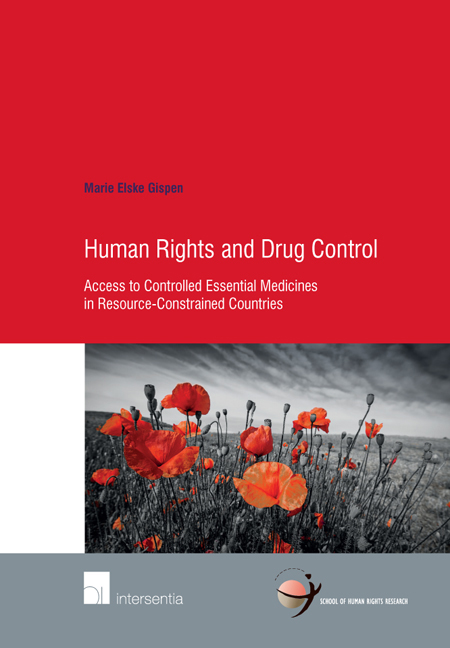 Human Rights and Drug Control
Human Rights and Drug Control from Part 2 - Normative Framework
Published online by Cambridge University Press: 27 September 2018
Introduction
In human rights law, balancing the access to (controlled essential) medicines on the one hand, with the protection of public health and public order against the hazardous use of substances on the other, differs from the balancing as framed in the international drug-control system. In various ways, the obligation to ensure access to medicines is a strict obligation under human rights law and is part of the core of the right to health. Moreover, depending on the situation, access to medicines falls within the scope of the prohibition of torture and cruel, inhuman, and degrading treatment. Consequently, providing access to medicines, including controlled medicines, is a matter of priority for States.
Awareness of this starting point requires a fundamentally different approach in current and future drug-control laws, policies, and regulation. Yet, questions arise about the normative justification of this interpretation – especially because human rights law itself is not explicit about how States should manage and discharge their dual obligations in the field of drug control. Is it normatively defendable to argue that States must prioritize efforts to secure access to medicines over the protection against the hazardous use of controlled substances? This question touches on the justification of the priority or absoluteness of some elements of the human rights system, and the balancing between rights beyond that which is regulated by law. Addressing the issue of justification is particularly pressing because some scholars hold that (human) rights are based on incommensurable values. More generally, the issue requires one to reflect on what human rights are about: to protect some basic moral standards beyond that which is written down in the law – which makes it necessary to reflect on the logic behind human rights and distinguishing their underlying concepts and purposes.
One can distinguish between a principle of rights and rights as enshrined in a legal instruments programme. The moral principles underlying the human rights framework are not necessarily the same as the legal rights enshrined in international human rights law. In order to understand the possibility of defending an ‘access-led’ approach of drug-control regulation within the general structure of the human rights framework, one is required to discuss the principles that are elemental to human rights law.
With this in mind, this chapter explores whether the ‘access-led’ approach found in law can be morally justified.
To save this book to your Kindle, first ensure [email protected] is added to your Approved Personal Document E-mail List under your Personal Document Settings on the Manage Your Content and Devices page of your Amazon account. Then enter the ‘name’ part of your Kindle email address below. Find out more about saving to your Kindle.
Note you can select to save to either the @free.kindle.com or @kindle.com variations. ‘@free.kindle.com’ emails are free but can only be saved to your device when it is connected to wi-fi. ‘@kindle.com’ emails can be delivered even when you are not connected to wi-fi, but note that service fees apply.
Find out more about the Kindle Personal Document Service.
To save content items to your account, please confirm that you agree to abide by our usage policies. If this is the first time you use this feature, you will be asked to authorise Cambridge Core to connect with your account. Find out more about saving content to Dropbox.
To save content items to your account, please confirm that you agree to abide by our usage policies. If this is the first time you use this feature, you will be asked to authorise Cambridge Core to connect with your account. Find out more about saving content to Google Drive.